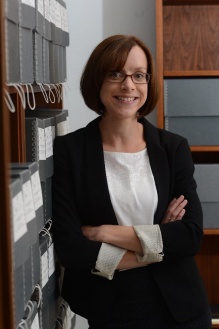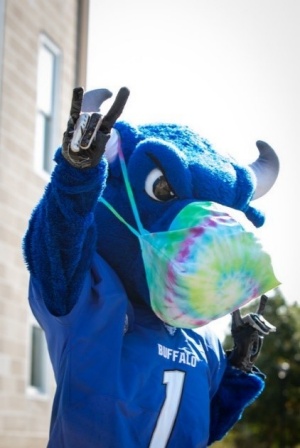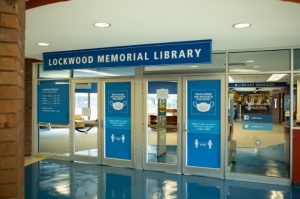UB Archives COVID-19 Project

Digital Archivist Sarah Cogley in the UB Archives
Digital Archivist Sarah Cogley
Please tell me a little bit about yourself and your work in the UB archives.
I am the digital archivist for special collections, and the University Archives is one of the departments within special collections. I've worked in the archives for a little over six years. In the Archives we collect the official records of the University at Buffalo and also its predecessor, the University of Buffalo before it became part of the SUNY system. We have records of the administrations like the president's office and the various Dean's offices. We also collect publications that the university puts out, and also student publications such as student newspapers, year books, things like that. In regard to the student body, we do have collections related to student organizations on campus. Outside of documenting the history of the university, and our student bodies, we also have manuscript collections, which generally reflect the research interests of our faculty members. We do collect faculty papers. We also house collections that have to do with Western New York. My job, the digital archivist, is a fairly new position. I've only been in this job for about a year. My job is to focus on records that are born digital. Anything that's been created on your computer, on the web, that type of thing, that's my focus. I specialize in digital preservation and providing access to these records for the long term.
Tell me a bit about the archives project documenting the UB community experience during the COVID-19 pandemic?
The idea for this project was not an original idea, I will completely admit to that. When the pandemic started or when people became aware of it, at the beginning of March, I started seeing various archives listservs circulating posts about collecting material. A lot of archives, unfortunately, have collections that are called grief-based collections, or collections that have been created in times of crisis. If you think about the various campus shootings that have happened in recent years, many archives have built collections around those types of events or even civil unrest or student protests on campus. So, this is wasn't a new idea. What was new about it for us here at UB in the archives is that this was the first time we have built a collection in real time, that is also primarily digital only. Colleges and universities across the country started thinking about how they would do this, and so we did some thinking of our own and decided it would be a good opportunity to document this time in the university's history and the community's history. Because of the digital nature of how we carry out our work, and socialize and communicate with each other, we knew that if we were going to build a collection around the pandemic, that it needed to start now, and not wait, because digital files are by nature, at risk from loss. We really wanted to do it as quickly as we could. So that's how the project started.

Victor E. Bull models proper mask wearing and UB pride.
We're trying to look at it from a couple different perspectives. The community's perspective is one. But we're also looking at it from an internal perspective, like the decisions that the university is making. We're collecting digital communication that are happening, like at the decanal unit and the various departments. We're also building a web archive of websites that UB has published that relate to COVID-19 and the university's response to COVID-19. We're documenting what we put out to the public, what's happening internally at the university, but also the community experience. It’s a three-prong approach. I would have to say being that we can collect these things in and do it all digitally for now is very exciting. If we didn't have the capacity to do that, we would really be behind the eight ball when we re-open.
How do you envision the material from this collection being used by future scholars, in particular historians?
I would not be surprised if we see researchers who are interested in public health, wanting to use the collection, researchers who are interested in history of education, educational policy, and even instructional methods, and the history of higher education in general. I also think that students can be very introspective and sometimes very curious about what student life was like in the past, so I could see students using this collection to take a peek back in time and see what the experience was like for the people who have come before them. We also have scholars who are interested in various topics that have to do with the history of Western New York. We also have collections about the Love Canal disaster in Niagara Falls, and documentation of environmental health crises. I think that this collection will be an asset for researchers who were interested in that type of issue as well. We get researchers all the time who are looking for specific pieces of information in the archives, and you wouldn't necessarily guess what their research topic is based on what they're looking for. We'll see what happens!

Mask and social distancing guidelines outside of Lockwood Memorial Library
What types of material are you collecting, and have you collected anything so far that has been particularly surprising?
We are encouraging people to submit anything from text documents like journaling or just their thoughts on what's happening. We welcome video files, audio, and digital images. We've had a staff member who's very interested in the environment, he sent us a blog that he has created. The particular post that he wanted to share with us was about Victory Gardens in Buffalo, which was really interesting. We received our first TikTok video, which is really a great example of how people are using social media. It was a class assignment that a professor had given them, that was kind of a surprise to us. It’s really interesting to see how creative people are. We've also had someone submit a recording of themselves over Zoom, talking about what it has been like as a faculty member teaching during this time, so those are all really, really great things that we welcome.
What are your own thoughts about being part of this project to preserve history?
For me, I would say it's interesting. I'm very thankful that we have the resources to do this type of collecting. I think that it is central to the mission of the University Archives, and also, just in terms of archivists, our code of ethics and what we believe in. I think that this is all part of that. It’s imperative that we collect in times of crisis like this, it has to happen.
I think that for me, personally, it has given me a sense of purpose during this really weird period. I have some concrete action that I can take. There so much you can't control right now, but I can control to a certain extent, this project and, and at least be a part of it. My main goal, especially with documenting the community experiences, is that we want people to know that their experiences matters. That's what this project is all about. It feels good that we can contribute in that way.
If you would like to learn more about the Archives’ COVID-19 Project or you would like to contribute visit their website. The University Archives has recently published a sampling of contributions to the project and a guide to the collection.